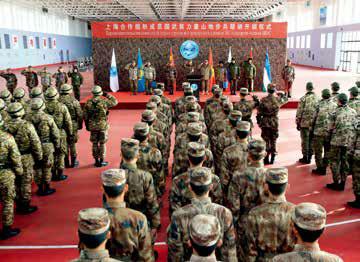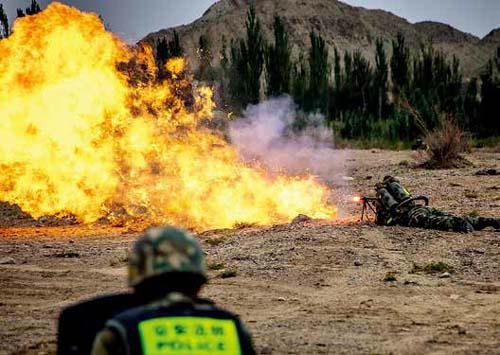SCO Security Cooperation Greater Challenges
2018-07-10byYuanShengyu
by Yuan Shengyu


The 2018 Shanghai Cooper- ation Organization (SCO) summit will be held in Qingdao, a coastal city in Chinas eastern Shandong Province, this June. Against the backdrop of major challenges in the international landscape, the summit has drawn wide attention both at home and abroad as the first of its kind since the organization expanded last year, testifying to the global importance of the SCO as the worlds largest regional cooperation organization. Security cooperation is the core mission of the organization. With India and Pakistan now admitted to the SCO, how should its member states work together to strengthen security cooperation and fight cross-border terrorism threatening the stability of the SCO region? The future of SCO security cooperation has become a hot topic within and beyond the region.
Security Cooperation at the Heart of the SCO
Officially founded in 2001, the SCO originated with a bloc of five countries (China, Kazakhstan, Kyrgyzstan, Russia and Tajikistan) that became known as the Shanghai Five after their first meeting in 1996. Initially, the Shanghai Five focused on demarcation negotiations and establishing mutual trust militarily in the border areas. Since 1998, the focus of the group has shifted to multilateral security cooperation and efforts to maintain regional stability. As the five countries began to prioritize the fight against terrorism, separatism and extremism, the SCO was gradually incubated. The regional cooperation organization has since been hailed as an innovative model for post-Cold War international security.
Over the past 17 years since its inception, the SCO has made fruitful achievements and accumulated rich experience in security cooperation. The close, effective security cooperation between its member states over the years laid a solid foundation for the SCO.
The Shanghai Spirit of “mutual trust, mutual benefits, equality, consultation, respect for diverse civilizations and pursuit of shared development” is the core value and guidelines for the SCO to carry out cooperation in multiple areas including security. Unlike the Cold War mentality, it transcends the curse of zero-sum games by effectively solving the “prisoners dilemma”threatening SCO member states in security cooperation. By doing so, the SCO has integrated regional stability with the national security of every member state and realized win-win cooperation and holistic security, setting a good example for building a new security concept for the post-Cold War world.
Peaceful settlement of disputes among member states through negotiation and consultation is a key factor driving the effective security cooperation of the SCO. History has shown that issues concerning the core interests of neighboring countries such as demarcation and border garrisons can be settled by peaceful means through equal-footed consultation. Such issues remain major obstacles hindering security cooperation.
Adhering to the principle that the interests of all member coun- tries, big or small, are equally important, the SCO has effectively carried out military cooperation, information exchange and joint drills aiming to combat terrorism, separatism and extremism, realizing positive achievements in security cooperation. Regarding the fight against terrorism, separatism and extremism, SCO member states have developed joint concepts and taken concerted action to make their security cooperation more pragmatic and safeguard the broader security of the region.
The SCO properly balances the relationship between security and development. Actually, security and development are not independent from each other—pursuing only one or the other will make both unsustainable. Over the past 17 years, the SCO has not only maintained regional stability and guaranteed shared development of all member countries through security cooperation, but also paved the way for eliminating security risks and forging a beneficial cooperation model based on common development.
Safeguarding Regional Stability and Prosperity
Development wont continue for long without security. Pursuing development while ignoring potential risks will leave it unsustainable. The stability and prosperity of the SCO region over the years could not have been achieved without long-term, effective security cooperation among relevant countries. Data has shown that wars, terrorism, separatism and extremism radically undermine and hinder development. Strengthening security cooperation to safeguard the development of the SCO region is a task that requires long-term, joint efforts of all SCO member states.
Over the years, the effective security cooperation among SCO member states has maintained the overall security and stability of the region, created a sound environment for domestic development in every relevant country, guaranteed the sustainability of various economic activities and helped foster a sense of security so work can move forward smoothly. Moreover, the overall safe environment of the SCO region provides a fundamental guarantee for international eco- nomic cooperation, trade and investment in and beyond the region, thus effectively promoting regional prosperity and development.
The SCO is undergoing changes with time. Nevertheless, the role of security cooperation in promoting regional stability and prosperity will only become more crucial. Especially after the addition of India and Pakistan, the SCOs potential for regional economic cooperation has greatly expanded. The alignment of development strategies of different countries will become an important driver for future development of the region. Economic interaction in and beyond the region will become more frequent, and personnel exchange will see a substantial increase. At the same time, security risks will grow accordingly. Therefore, the SCO will face greater future challenges in building a sound regional environment and coping with the threats of terrorism, separatism and extremism. The mission and governing regulations of the SCO security cooperation mechanism will continue expanding. For instance, cooperation in information security will become more and more important.
New Day for Security Cooperation
In recent years, new problems have emerged in some Western countries, which have resulted in profound changes in international and regional landscapes. Isolationism and protectionism are intensifying, and anti-globalization sentiment and populism are on the rise, causing anxiety over instability and uncertainty. In this context, the traditional regional cooperation model is facing new challenges. Meanwhile, some Eastern countries represented by China have maintained steady development while striving to build a community with a shared future for mankind and a multi-polar world. In addition to the increasingly complicated international situation, the SCO also faces a severe threat from international terrorism. In particular, Afghanistan has been plagued by terrorism, separatism and extremism. Facing these new challenges, the SCO is embarking on a new journey in security cooperation.
Both long plagued by terrorism, separatism and extremism, India and Pakistan naturally took their concerns on such problems to the SCO when they joined the organization. SCO member states maintain different concepts and practices in security cooperation. The Shanghai Spirit remains the solution to bridging differences. As Chinese Foreign Minister Wang Yi said, the fundamental reason for the SCOs development and growth is that its member states have consistently and firmly upheld the Shanghai Spirit. Security cooperation is the foundation for the SCOs continual development, so its member states must further consolidate the foundation under the guidance of the Shanghai Spirit.

With the addition of new members, the SCO needs to adjust its existing security cooperation mechanism to address changes through consultation to better safeguard the overall security interests of all member states and guarantee the effectiveness of its cooperation model. Now that India and Pakistan have been admitted to the SCO, a total of four of the organizations member states have nuclear weapons, so it is necessary for it to formulate plans and mechanisms concerning nuclear security cooperation. And considering the increasing numbers of maritime powers in the SCO, the organization must strengthen institutionalization of maritime security cooperation and formulate new cooperation plans.
As the largest country in South Asia, India has ambitions to become a great power while maintaining a certain amount of independency and influence in terms of international security cooperation. Coordinating security cooperation within the SCO while optimizing the organizations influence in international security affairs is a mission that requires concerted efforts of all member states, old and new, through friendly consultation. In particular, SCO member states need to work together to explore solutions to the Afghanistan issue, a common security threat to all of them, while avoiding internal friction caused by different interests, which could prevent them from acting as a consolidated force. With the Afghanistan issue as a central focus, the SCO should continue reinforcing its regional and global influence in security.